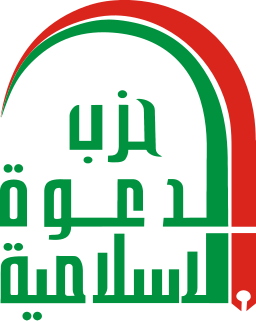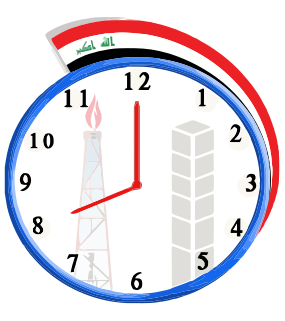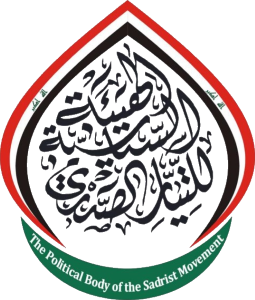The politics of Iraq take place in a framework of a federal parliamentary representative democratic republic. It is a multi-party system whereby the executive power is exercised by the Prime Minister of the Council of Ministers as the head of government, as well as the President of Iraq, and legislative power is vested in the Council of Representatives and the Federation Council.

The Islamic Supreme Council of Iraq is an Iraqi Shia Islamist Iraqi political party. It was established in Iran in 1982 by Mohammed Baqir al-Hakim and its political support comes from Iraq's Shia Muslim community.

Ansar al-Islam or Ansar al-Islam fi Kurdistan, also referred to as AAI, is a Sunni Muslim insurgent group in Iraq and Syria. It was established in northern Iraq by former al-Qaeda members in 2001 as a Salafist Islamist movement that imposed a strict application of Sharia in villages it controlled around Biyara to the northeast of Halabja, near the Iranian border. Its ideology follows a literal interpretation of the Quran and promotes a return to what it claims is the example of the first Muslims (Salaf). Following the 2003 invasion of Iraq, the group became an insurgent group which fought against the Kurdish government, American led forces and their Iraqi allies. The group continued to fight the Iraqi government following the withdrawal of U.S. troops from Iraq, and sent members to Syria to fight the government following the outbreak of the Syrian Civil War.

The Islamic Dawa Party, also known as the Islamic Call Party, is a political party in Iraq. Dawa and the Supreme Islamic Iraqi Council are two of the main parties in the religious-Shiite United Iraqi Alliance, which won a plurality of seats in both the provisional January 2005 Iraqi election and the longer-term December 2005 election. The party is led by Haider al-Abadi, who was the Prime Minister of Iraq from 8 September 2014 to October 2018. The party backed the Iranian Revolution and also Ayatollah Ruhollah Khomeini during the Iran–Iraq War and the group still receives financial support from Tehran despite ideological differences with the Islamic Republic.

The National Iraqi Alliance, also known as the Watani List, is an Iraqi electoral coalition that contested the 2010 Iraqi legislative election. The Alliance is mainly composed of Shi'a Islamist parties. The alliance was created by the Supreme Council for Islamic Revolution in Iraq to contest in the January 2005 and December 2005 under the name United Iraqi Alliance, when it included all Iraq's major Shi'a parties. The United Iraqi Alliance won both those of elections however later fell apart after several major parties left the alliance due to disputes with Prime Minister Nouri al-Maliki and the Supreme Council.

Parliamentary elections were held in Iraq on 15 December 2005, following the approval of a new constitution in a referendum of 15 October.

Islamic Virtue Party is an Iraqi political party.
The first government of Iraq led by Nouri al-Maliki took office on May 20, 2006 following approval by the members of the Iraqi National Assembly. This followed the general election in December 2005. The government succeeded the Iraqi Transitional Government which had continued in office in a caretaker capacity until the new government was formed and confirmed.
Abd al-Rahim Ahmad Ali al-Hasini is an Iraqi politician and secretary-general of the Shia Islamist Islamic Virtue Party, which is based in Basra.

The Sadrist Movement is an Iraqi Islamic national movement led by Muqtada al-Sadr. The movement draws wide support from across Iraqi society and especially from the Shi'a poor in the country. The most important person in setting the goals and the philosophy of the movement was Grand Ayatollah Mohammad Mohammad Sadeq al-Sadr. A prominent preceding influence had also been Muhammad Baqir al-Sadr. The movement is religious and populist. Its goal is a society ordered by a combination of religious laws and tribal customs.
Abdel Falah Hassan Hamadi al-Sudani is an Iraqi politician who was the Minister of Trade from May 2006 to May 2009 in the government of Nouri al-Maliki. He previously served as Education Minister in the Iraqi Transitional Government from May 2005 to May 2006.
Hamid Juma Faris Jouri al-Saeedi was a member of Al-Qaeda in Iraq accused by Iraq's government of being "the number two al-Qaeda leader [in Iraq] after Abu Ayyub al-Masri." He was captured during a joint raid by Iraqi and United States forces on June 19, 2006 either north or southwest of Baquba, Iraq.
The government of Iraq has established a committee to consider a proposed amendment to the Constitution of Iraq.

Zubayd or Zubaid is a large Arab tribe that migrated to Iraq, and Ahwaz before and after the Islamic conquest. The tribe was an offshoot of the Yemeni tribe of Madhhij, which is a Qahtanite Arab tribe. The Zubayd tribe hails from and derives its name from a town on Yemen's western coastal plain known as Zabid.
The Basra governorate election of 2009 was held on 31 January 2009 alongside elections for all other governorates outside Iraqi Kurdistan and Kirkuk.

The State of Law Coalition also known as Rule of Law Coalition is an Iraqi political coalition formed for the 2009 Iraqi governorate elections by the Prime Minister of Iraq at the time, Nouri al-Maliki, of the Islamic Dawa Party.
This article concerns the formation process of the Al Maliki I Government of Iraq in the aftermath of the Iraq National Assembly being elected on December 15, 2005. Due to disputes over alleged vote-rigging the results of the election were only certified by the Independent Electoral Commission of Iraq on February 10, 2006.

Governorate or provincial elections were held in Iraq on 20 April 2013, to replace the local councils in the governorates of Iraq that were elected in the Iraqi governorate elections of 2009. Elections took place in 12 of Iraq's 18 governorates. Elections didn't take place in the 3 governorates forming the Kurdistan Region or Kirkuk, Anbar, or Nineveh, meaning that a total of 378 provincial council seats were up for election.
The 2005 Erbil bombing was a suicide attack on the offices of Kurdish political parties in Erbil, Iraq, on May 4, 2005. The attacker detonated explosives strapped to his body as people lined up outside a police recruiting center in Erbil. Ansar al-Sunna claimed responsibility. This attack is an example of religious terrorism, groups who commit terrorist acts because of religion believe that their deity or deities are on their side and that their violence is divinely inspired and approved. This attack is also an example of Strategic terrorism. Which is a form of terrorism where the terrorist plans to inflict mass casualties. The goals of Strategic terrorism are normally not local objectives but global objectives or regional objectives. Ansar al-Sunna's goal is to transform the country of Iraq into an Islamic state so their goals are regional.










